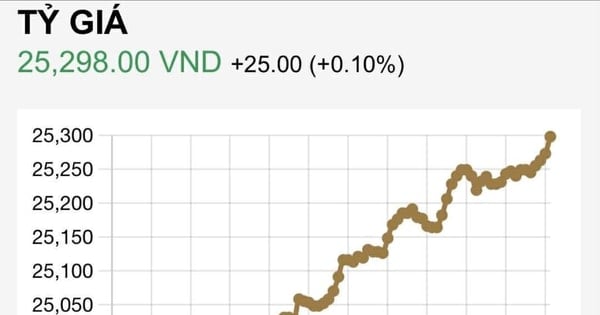The trade war is at risk of spreading and many political fluctuations and conflicts are taking place, causing the global economy to face great challenges.
Moody's Analytics (part of Moody's Financial Services Group) has just sent Thanh Nien a new report on the world economic situation.

Consumer prices in the US are showing signs of rising.
Difficulty gets harder
The global economy is entering a period of severe uncertainty, according to Moody’s Analytics. The United States has outperformed its allies over the past three years, but its economy is showing cracks. Europe remains stuck in stagnation, suffering significantly from capacity problems, declining manufacturing and deep structural instability. Meanwhile, the UK economy is particularly weak.
China is close to meeting its 2024 growth target (4.8% versus a target of 5%) but domestic demand remains sluggish, weighing on the economy. Japan, Canada and Australia each face their own constraints. India and other emerging economies outside China are doing better, but they are not immune to global economic uncertainty.
Meanwhile, just a few weeks after taking office as US President, Donald Trump has implemented a series of tariff measures aimed at both allies and opponents. The US increased tariffs twice, totaling 20% on Chinese goods, which is just the beginning of the trade war. The White House also applied a 25% tariff on steel and aluminum from all countries. Not to mention, the Trump administration is considering increasing tariffs on copper and wood products, and considering new tariffs on goods from the EU and its allies in Asia. That makes the trade war really explode, not just a potential risk.
Many consequences
The developments have disrupted markets, with recent surveys showing declining business expectations, slowing consumer spending, and a struggling retail and labor market. In fact, real US GDP may even have contracted in the first quarter of this year.
That has a significant impact on monetary policy as well as inflation control.
Inflation has been falling in the US for the past two years, but this positive trend is now being challenged. US inflation has picked up again. At the same time, other economies are facing rising food and energy costs and falling currency values, making life difficult for people. This is evident in Japan, where inflation in January 2025 was 4% compared to the same period in 2024.
The negative inflation picture could lead central banks to limit monetary policy easing. The US Federal Reserve (Fed) is delaying a cut in its benchmark interest rate to assess developments, especially when inflation is showing signs of rising again due to tariffs, trade wars and government spending cuts. A more cautious Fed would lead to a slower-than-expected global monetary easing.
However, the report expects other central banks to be less affected by the Fed’s policy, with the European Central Bank and the Bank of England expected to continue cutting interest rates until the end of the third quarter of 2025.
Commenting on the Chinese economy, Moody's Analytics assessed that the government's target of around 5% growth this year is in line with its ambitions and results in 2024. However, if exports become an important factor in achieving the growth target in 2024, this pillar will be very difficult in 2025 due to the impact of the trade war.
In addition, the report also pointed out a number of other challenges of the global economy, such as the unpredictable conflict in Ukraine that has had a significant impact on the global energy market, or political fluctuations in Europe that have also had a significant impact.
US stock market lost 5,000 billion USD in 3 weeks
Last night, CNBC cited statistics showing that the US stock market has lost more than $5 trillion in market value in just the past three weeks. Specifically, the market value of the S&P 500 at its peak on February 19 was $52.06 trillion, but by March 13, the continuous decline left the market with only $46.78 trillion.
The decline comes amid a trade war sparked by President Trump's tariff policies that has rattled markets.
Source: https://thanhnien.vn/kinh-te-toan-cau-trong-con-dia-chan-185250314225705827.htm




![[Photo] General Secretary To Lam attends the 80th Anniversary of the Cultural Sector's Traditional Day](https://vstatic.vietnam.vn/vietnam/resource/IMAGE/2025/8/23/7a88e6b58502490aa153adf8f0eec2b2)



![[Photo] Prime Minister Pham Minh Chinh chairs the meeting of the Government Party Committee Standing Committee](https://vstatic.vietnam.vn/vietnam/resource/IMAGE/2025/8/23/8e94aa3d26424d1ab1528c3e4bbacc45)
































































































Comment (0)